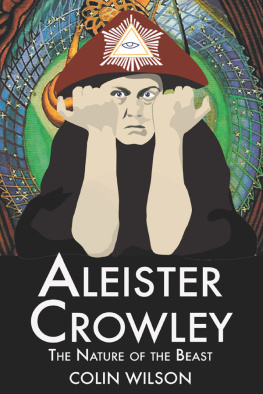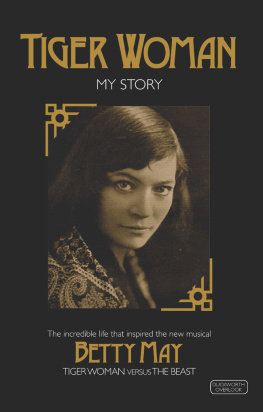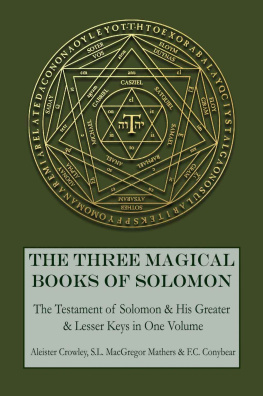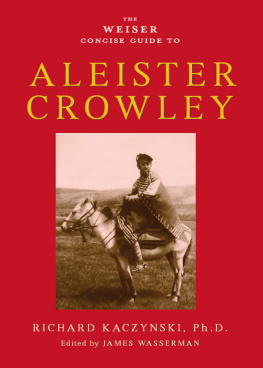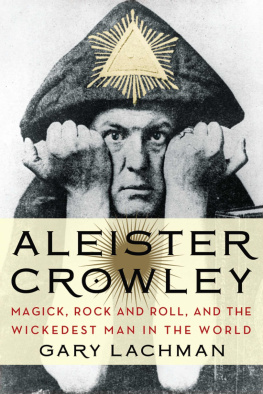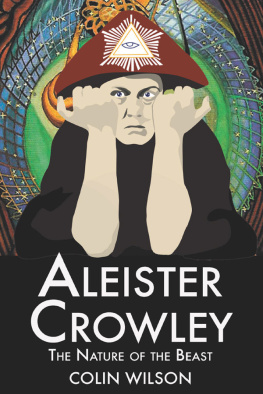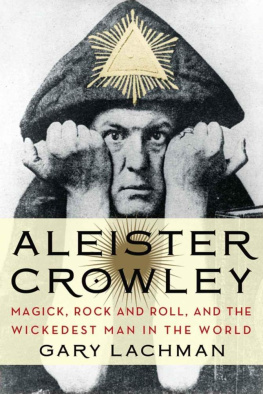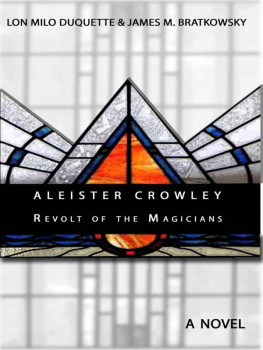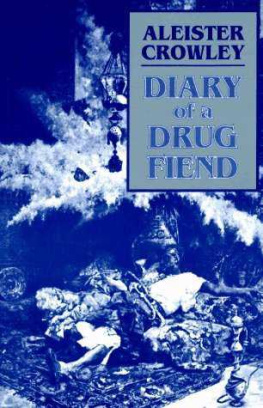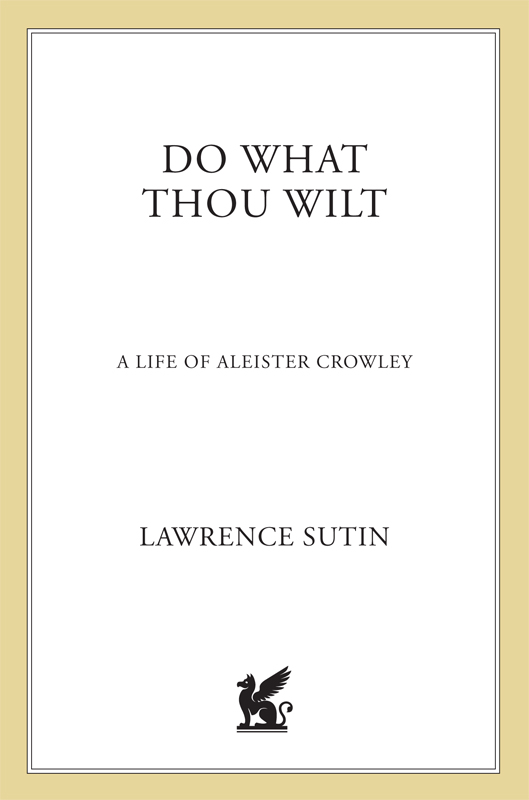Contents
Guide

The author and publisher have provided this e-book to you for your personal use only. You may not make this e-book publicly available in any way. Copyright infringement is against the law. If you believe the copy of this e-book you are reading infringes on the authors copyright, please notify the publisher at: us.macmillanusa.com/piracy.
C ONTENTS
An Overview of the Magical Tradition, in Which It Is Suggested that the Raging Battle Between Jesus and Satan Be (For the Moment) Set Aside in Order that the True Nature of the Magus Be Understood
The Strange Transformation of One Edward Alexander (Alick) Crowley, a Pious Christian Boy of the Late Victorian Upper Class, Into Aleister Crowley, Poet, Gent., and Magical Adept in Waiting (187598)
In Which Aleister Crowley Takes the Magical Name Perdurabo (I Shall Endure to the End) But Appears to Lose His Way Amidst the Schisms of The Golden Dawn and the Temptations of the Vale of Tears (18981900)
Years of Wandering in Which Crowley Pursues the Heights of Magic and Mountains, Embraces Buddhism, Then Abandons All for the Love of a Woman and the Life of Country Laird (190004)
The Birth of the New Aeon (190405)
The Assault on Kanchenjunga, the Establishment of a New Magical Order, and the Wanderlusts of a Magus (190508)
The Creation of The Equinox, the Rites of Eleusis, and a Confrontation in the Sahara with the God of Chaos (190914)
In Exile in America, Crowley Endures Poverty and Accusations of Treason as Ordeals Necessary to Becoming a Magus (191419)
The Founding and the Ruin of the Abbey of Thelema (192023)
Years of Exile and Wanderingand the Publication of a Masterwork (192330)
A Staged Suicide, an Unavenged Libel, and the Equinox of the Gods (193036)
The Final Years of a Magus in the Guise of a Disreputable Old Man (193747)
An Assortment of Posthumous Assessments and Developments
A CKNOWLEDGMENTS
The researching and writing of this biography has occupied a goodly portion of my time over the decade 198999. It would be impossible to thank everyone who assisted me with information and moral support over that period. But the following persons and institutions deserve mention here.
The initial inspiration to write a life of Aleister Crowley came from my good friend Greg Overlid, a resolute explorer of conceptual frameworks. Another dear friend and fellow writer, Marshall Fine, commiserated with me throughout the winding emotional road from initial proposal to final publication.
The staffs of the Warburg Institute, University of London; the Harry Ransom Humanities Research Center, University of Texas at Austin; the Liddell Hart Center for Military Archives, Kings College, University of London; the British Museum, London; and the Wren Library, Trinity College, Cambridge University, were helpful during my researches at those institutions. While in Great Britain from January to April 1990, I enjoyed the hospitality of several persons knowledgeable as to Crowley, notably Geraldine Beskin, Richard Cavendish, Nicolas Culpepper, Clive Harper, Francis X. King, Anthony Naylor, Keith Richmond, Timothy dArch Smith, Stephen Skinner, Michael Staley and Isabel Sutherland. Upon my return to the United States, I drew upon the Crowley expertise and archives of Gerald and Marlene Cornelius and William E. Heidrick.
Throughout the entire decade of work, the support and friendship of Hymenaeus Beta, Frater Superior, O.T.O., has been of enormous value. It was he who was the sole reader of my initial draftin excess of 1,800 pagesand it was he who kindly and thoroughly scrutinized the final version that is now before the reader. No other person outside of St. Martins Press has so served as reader and querent, and no other person could have done so fine a job. While Hymenaeus Beta is a religionist and I am an outsider and skeptic with respect to the Thelemic creed, his criticisms of my writing were always respectful and made in the service of factual truth. Nonetheless, he and I disagree on numerous points as to the interpretation of Crowleys life, and my views as set forth in this book should not be mistaken as representing his own. Naturally, any errors that remain in the text are solely my responsibility.
As for my wife, Mab, who bore with me through years of labor that did little to support our family, and that are likely to receive little thanks from the world at large, words fail me.
I NTRODUCTION
An Overview of the Magical Tradition, in Which It Is Suggested that the Raging Battle Between Jesus and Satan Be (For the Moment) Set Aside in Order that the True Nature of the Magus Be Understood
Biographers are fond of observing that their subjects have been much misunderstood.
Among other reasons, this view serves nicely to justify their labors. Why trouble the reader with a fresh portrait when clarity reigns?
In the case of Aleister Crowley (18751947), one is compelled to conclude that he has been as greatly misunderstood as any biographer could wish. In truth, misunderstanding hardly serves to convey the degree of hatred and fear which the name of Crowleyaka The Great Beast and The Wickedest Man on Earthcontinues to inspire to the present day. The popular image endures of Crowley as a vicious Satanist who employed illicit drugs and perverted sex to enliven the weary charade of his blasphemous magick (Crowleys own distinctive spelling for his development of traditional magic).
Virtually every current handbook on the cult crisis in America features a purple-prose paragraph on the sinister Crowley who has inspired numberless depravities culminating in ritual rape and murder. Amongst scholars, it is common to dismiss Crowley as notorious and his theories as mercifully obscure without having scrupled to read his books. To question this blackest of black assessment of Crowleymerely to suggest a touch of grayis to inspire suspicion that you are in cahoots with the Satanists.
Crowley is, admittedly, a complicated case. One can hardly blame people for feeling hatred and fear toward Crowley when Crowley himself so often exulted in provoking just such emotions. Indeed, he tended to view those emotions as inevitable, given what he regarded as the revolutionary nature and power of his teachings and the prevailing hypocrisy of societyand not merely that of his native Britain, mind you, but of the whole of the Christianized West and, for good measure, of the entire unawakened world. Antagonism toward the religious powers that be was the essence of Crowleys vision of his life and of his missionCrowley who brandished and popularized his role as the Beast of Revelations come to life, the selfsame 666 proclaimed in the Biblical text as the number of a man. Small wonder that the evils of Satanism are laid at his feet. As one disciple of the Beast has observed, There is no sense in trying to whitewash Crowleys reputation. Aleister spent most of his life systematically blackening it.
Clearly, this Crowley fellow was an egregious sorta shameless scoffer at Christian virtue, a spoiled scion of a wealthy Victorian family who embodied many of the worst John Bull racial and social prejudices of his upper-class contemporaries, a blisteringly arrogant opportunist who took financial and psychological advantage of his admirers, an unadmiring and even vicious judge of most of his contemporaries, a sensualist who relished sex in all forms, a hubristic experimenter in drugs who was addicted to heroin for the last twenty-five years of his life. No question that the sheer egotistical bombast of the man could be stupefying. For the Beast regarded himself as no less than the Prophet of a New Aeon that would supplant the Christian Era and bring on the reign of the Crowned and Conquering Child, embodiment of a guiltless, liberated humanity that had, at last, chosen to become the gods it had merely worshiped in the past.


